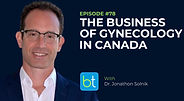BackTable / OBGYN / Podcast / Episode #32
Hysteropexy vs Hysterectomy for Pelvic Organ Prolapse
with Dr. Olivia Chang
This week on BackTable OBGYN, Dr. Suzette Sutherland (University of Washington) and Dr. Olivia Chang (UC Irvine) discuss reasons for uterine preservation and hysteropexy techniques for prolapse repair.
Be part of the conversation. Put your sponsored messaging on this episode. Learn how.

BackTable, LLC (Producer). (2023, September 13). Ep. 32 – Hysteropexy vs Hysterectomy for Pelvic Organ Prolapse [Audio podcast]. Retrieved from https://www.backtable.com
Stay Up To Date
Follow:
Subscribe:
Sign Up:
Podcast Contributors
Dr. Olivia Chang
Dr. Olivia Chang is an assistant professor of clinical urology and the chief of female urology, pelvic reconstructive surgery and voiding dysfunction in the department of Urology at UC-Irvine in California.
Dr. Suzette Sutherland
Dr. Suzette Sutherland is the director of female urology with UW Medicine in Seattle, Washington.
Synopsis
First, Suzette and Olivia discuss the value of keeping the uterus in place for women undergoing prolapse repairs, as well as the indications for apical suspension surgery. They also note the historical context of hysterectomy and why it has been the go-to treatment for so long. Next, the doctors discuss the advantages of hysteropexy over hysterectomy for prolapse repair, such as a shorter operative time, less bleeding, and a quicker recovery. The doctors then go into more detail about the best approaches for prolapse repair, like weighing the options of permanent sutures versus delayed absorbable sutures. They also analyze recurrence rates after prolapse surgery, specifically in the anterior compartment.
Then, they explore the data on how the choice to keep the uterus in place can stem from a woman's personal and cultural views. Olivia shares about the Value of Uterus questionnaire, a six-question survey instrument that can quantify how a woman values her uterus. It can streamline clinic visits and help to predict whether a woman would choose a uterine-preserving procedure. The doctors note that there is research demonstrating a correlation between valuing the uterus and sexual activity.
Finally, Suzette and Olivia contraindications for leaving the uterus in place. They emphasize the importance of assessing for abnormal uterine bleeding and cervical pathology before recommending uterine preservation. They suggest that listeners review the current guidelines around preoperative workup and consider transvaginal ultrasound or endometrial biopsy first. Lastly, they emphasize the importance of symptom and risk stratification and shared decision making when it comes to uterine preservation.
Resources
Chang OH, Walters MD, Yao M, Lapin B. Development and validation of the Value of Uterus instrument and visual analog scale to measure patients' valuation of their uterus. Am J Obstet Gynecol. 2022 Jun 25:S0002-9378(22)00483-5. doi: 10.1016/j.ajog.2022.06.029. Epub ahead of print. PMID: 35764134.
https://pubmed.ncbi.nlm.nih.gov/35764134/
Transcript Preview
[Dr. Suzette Sutherland]
Let's just get started. I think historically the answer to all women's problems was always a hysterectomy. When we really look historically and look back at the turn of the last, last century, many women had a hysterectomy to try and fix their emotional hysteria, which is sometimes where the term comes from. We know today that removing a woman's uterus is not the answer to all of her problems, right? Then, on the contrary, it can actually cause some problems. There has been a movement to say, "Why do we always remove this uterus if it's not needing to be removed for another reason, like cancer? How can we utilize it in the repair and maybe actually even improve upon the repairs that we are doing?" That's what we're here to talk about today.
Disclaimer: The Materials available on BackTable.com are for informational and educational purposes only and are not a substitute for the professional judgment of a healthcare professional in diagnosing and treating patients. The opinions expressed by participants of the BackTable Podcast belong solely to the participants, and do not necessarily reflect the views of BackTable.















